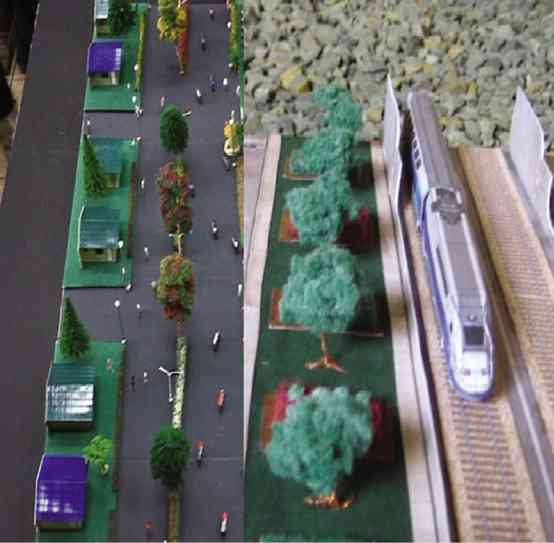Road sharing petition filed in SC Monday

UNDER a road sharing scheme being proposed by environmentalists, all roads would be used according to the 70-30 principle: 70 percent would be set aside for sidewalks, bike lanes and gardens while the remaining 30 percent would be for an organized transport system. Contributed photo
A movement pushing for a road sharing scheme among motorists, cyclists and pedestrians may just be the answer to the worsening traffic situation in the country, especially in Metro Manila.
The “road sharing principle” being pushed by environmentalists in a petition to be filed Monday in the Supreme Court envisions a 70-30 division of all roads nationwide—70 percent will be devoted to covered sidewalks, bike lanes and urban gardens while 30 percent will be set aside for an organized transport system.
More specifically, 30 percent will be used for sidewalks, another 30 percent for bike lanes, 10 percent for urban edible gardens and the remaining 30 percent for a useful transport system.
Environmental crusader Antonio Oposa, a co-convenor of the road revolution principle, said during his recent visit to the Inquirer office that petitioners would ask the high tribunal to issue a “writ of kalikasan” to restore a “balanced and healthy ecology” and put an end to acts threatening the environment.
Reform of road system
At the same time, they would also seek the strict implementation of Executive Order No. 774 issued in 2008 which pushed for a reform of the road system based on the principle that “those who have less in wheels must have more in roads.”
The division of streets, according to Oposa—a recipient of the 2009 Ramon Magsaysay Award for his “path-breaking and passionate crusade to engage the Filipinos to protect and nurture the environment”— was primarily aimed at restoring order and addressing the country’s traffic problem.
“With this, people can predict their travel time from one destination to another,” he said, adding that the move could also bring back discipline among Filipinos.
At the same time, the proposed policy would ensure fairness in the use of public space and funds as Oposa noted that although only a little over one percent of the population nationwide own private cars, “all the roads are given to them.”
“Space is the most precious resource especially here in Metro Manila so let us not waste it by adding more cars on the road,” he said as he explained that a car could consume about 15 square meters of road space.
An incentive to commute
If the government can invest in an efficient transport system, people will be encouraged to use trains or buses instead of traveling in their cars, he added.
And by an “efficient” transport system, he was referring to a “Filipino-made collective and nonpollutive transport setup” that was reliable and convenient for the people.
Oposa even suggested setting up a train that would run on solar energy and was supported by a wind-operated generator for charging. In 2011, an environmental group in Cebu pushed for the establishment of a minitrain prototype whose parts were mainly made from bamboo.
“Maybe it is time to make the Filipino genius in us work,” he said, noting that technology was readily available as well as concepts for creating useful and energy-efficient modes of transport.
As for funding, Oposa said the government could allot a part of the road users’ tax for the project’s implementation.
Aside from easing traffic, the road sharing scheme will also promote clean air and encourage healthy practices in Filipinos who will be given the option to walk or ride bikes, he added.
“The petition to be filed [today] will be on behalf of the ‘carless’ people of the Philippines, persons with disabilities (PWDs), children, elderly, women and even car owners who are calling for an efficient transport system,” he explained.
Urban edible gardens
Another vital part of the road division, according to Oposa, was the urban edible garden or the planting of vegetables on paved roads in cities which would aid in improving air quality in urban areas nationwide.
Oposa said that Section 12 of EO 774 stated that “public open spaces along sidewalks and roads no longer needed shall be devoted to urban agriculture for fruits, vegetables, medicinal herbs and plants.”
Asked how this scheme would be implemented, he replied that once a writ of kalikasan was issued, environmental youth groups and the project proponents would schedule a one-day road sharing day every week to illustrate the working principles of the road system.
In June 2011, Oposa and other environmental advocates closed Cebu City’s Osmeña Boulevard to vehicles for 16 hours. The road stretch was turned into a huge park where people and cyclists were allowed to roam.
This activity, according to Oposa, can be repeatedly done on major thoroughfares in the country to practice the propositions of the road revolution program and adjust the mindset of people on the usage of roads.
But as the whole country awaits the fulfillment of this dream,” he urged the public to join the “Walk for WoK” (Writ of Kalikasan) at 6 a.m. today at Rizal Park. Participants will then proceed to the Supreme Court for the filing of the petition and then to the Senate in Pasay City for the filing of the people’s initiative to pass the Share the Roads Law.
“We are asking the children, senior citizens, PWDs, doctors, cyclists, runners and all ordinary citizens of the Philippines who are fed up with traffic congestion, air pollution and criminality on the streets to walk with us in filing the petition that will enforce the road sharing principle,” Oposa urged.
He also noted that it was about time that people launch a peaceful revolution and a turnaround of the mindset, “using only as our arms the sword of reason, the firepower of the law and the violence of an idea.”
Interested individuals may visit www.sharetheroads.net for details.